What is the labor movement
In this new video from Unprofesor we will explain what the labor movement is.
The labor movement; mid century XVIII, full emergence of the industrial revolution. There has been a great demographic growth due to improvements in health and food (especially) and when the industry appeared we found ourselves with a great exodus of the towns (rural zones) to the city (to work in factories). This makes a new social class grow and emerge; the workers (the proletariat). Employees in factories that worked in inhumane conditions; a lot of misery, a lot of overcrowding in the cities, brutal working conditions, very long hours, where even children and women they worked long hours, corporal punishment, miserable salaries... in all this breeding ground is where the movements arise workers.
The closest thing would be the brotherhoods and guilds of the Middle Ages. Artisans who came together to defend their rights, set prices and protect each other. As a result of these brotherhoods, over time and especially in England, the first social movements emerged in the form of unions. Now that we have seen where this movement comes from, we are going to explain what it is:
Social political movement that seeks to improve the conditions of the workers / proletarians in front of the capitalist system (bourgeoisie).To know the subject in more depth, do not miss the complete video on the labor movement and practice with the exercises that we leave you below.



